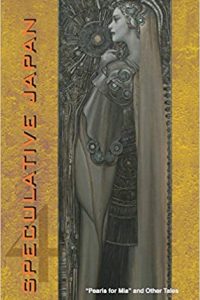Charles Payseur Reviews Short Fiction: Reckoning, Drabblecast, and Strange Horizons
 Reckoning 1/22
Reckoning 1/22
Drabblecast 1-2/22
Strange Horizons 2/21/22, 2/28/22, 3/7/22, 3/14/22
Let’s start with the latest release from Reckoning, an annual journal dedicated to environmental justice. Their sixth issue is edited by poetry editor Aïcha Martine Thiam and prose editor Gabriela Santiago. The content is released online throughout the first half of the year, but the journal itself is as large as many anthologies, and peppered with commentary on the state of the planet and on humanity’s relationship with the Earth. The issue opens with a number of poetic works, including the beautiful and bracing “Resilience” by Francesca Gabrielle Hurtado. The poem interrogates the concept of resilience, exploring the cost of it, and the power of especially the Filipino people for whom the word embodies a history and way of life. Russell Nichols then reveals a striking vision of water, of grief and tears and faith, in his poem “Move, Mountain, Move”. Like the title, the piece as a whole evokes power, prayer, and a deep hope. Nichols’s second poem, “oh to be”, provides a balanced and innovative use of the page space, capturing the rise and fall of a chest, the act of breathing. It centers hope and yearning without ignoring the weight of history.
Nicasio Andres Reed pens the first short story of the issue with “Babang Luksa”, featuring Gino, a civil engineer returning after a long absence to his home, to his family – though not all of that family is still there. The home, too, has changed, becoming a physical island as rising global water levels have devastated the world. And yet people survive, and Gino is left to face the grief and loss that he had tried to avoid. Reed wields an understated but powerful prose, capturing a messy family situation wrapped inside a fractured world. The effect is moving and emotionally resonating, Gino’s journey a physical one but also a coming to terms with the change happening all around and inside him. “Gills” by Nicholas Clute, then, continues to examine family and risen waters, as two brothers dive for biological treasures in what used to be San Francisco. The work is fueled by dreams of making enough to escape the slow crush of their poverty and situation. When it comes to it, though, doing the right thing while being surrounded by those who don’t means those dreams remain just out of reach. “water-logged roots” by Cislyn Smith continues the theme of place and decay, the poem examining the things that bind a person to one part of the world, to a home. It shows that for all those bonds stretch deep, there are forces stronger still. And change comes, especially when people forget that where they put down roots is part of a larger landscape, all of which needs to be cared for and maintained.
Though the issue opens to themes of water and family, it shifts slowly to images and ideas of apocalypse, extinction, and devastation. “Dramatis Personae of the Apocalypse” by Avra Margariti, for instance, is a poem showing different reactions to the world ending. It lingers on how so many people try to do things that find beauty in the end of the world. The result is bleak but quite good. Takayuki Ino also looks at harm and horror in “Osprey’s Sky”, which centers people who clean out dead animals and humans from around a nuclear disaster site. Rather than trying to heal the area, they are mostly trying to make it presentable, and maintain the very systems that led to the devastation, ones that value image over impact.
Not that there is no hope at all in the issue. In “E.I.”, Kola Heyward-Rotimi envisions a future where the Earth has a voice and a role in governance. And I love the structure and the way Heyward-Rotimi casts Prisca, the main character, as wanting to take something from the past, to remember things despite the pain, to walk the balance between the past and future. Similarly, “Possession” by Taylor Jones doesn’t shy away from showing the ravages of climate change, introducing an Earth where a sentient fungus that can possess humans has been awakened from the melting ice. But it also holds to a kind of hope that humans can still learn from their mistakes, can find new ways forward, even if there are no ways back to how things were. And the issue ends with the poignant “What Good Is a Sad Backhoe?” by Luke Elliott. The piece is framed as the productivity reports from an increasingly sentient “backhoe” that is abandoned by humanity. With humanity’s values suddenly made irrelevant, the AI sets to finding its own meaning in a harsh and unforgiving place, and begins to help a small population of rats, despite its programming telling them to continue the work they were assigned. It shows the need to break free from seeing and organizing the world around utility and profit, when people, environmental stewardship, and community are what keep people alive.
Catching up on Drabblecast’s 2022 releases, its January story served up a somewhat wicked twist on Santa Claus with Tim Pratt’s “How Lovely Are Your Branches”. Bishop isn’t a Hallmark Channel Claus, having dedicated himself to punishing the very naughty rather than rewarding good children. In a noir-tinged style, Pratt follows Bishop as he tracks down an old acquaintance who has learned a few new tricks. Their confrontation, though, doesn’t exactly go to anyone’s plan. February’s “In My Brain in My Body” by Evan Robert Barber dives into even deeper and more shadowed depths as a biologist investigates some strange behavior in a great white shark, and in finding the causes makes a much larger discovery, though not one they’re like to get credit for, given what happens next. It’s a grim piece well suited to audio, where all the voices inside the narrative have a chance to be heard.
At Strange Horizons, February’s fiction releases close out with P. Akasaka’s “Annunciation”, which features the birth of a new language. The child of English and Japanese, the language is carried by a chosen woman who isn’t entirely pleased with her situation, who is pressured by an angel and yet unsupported by any of the people who insist on her sacrifice. In poetry, “Add To Cart” by Alyza Taguilaso is a rather sharp look at the commercial side of magic, where wonders and cures are commodified, satisfaction guaranteed. Yet by making magic available at a price, the idea of magic is cheapened and changed. Darius Jones’s “The King Becomes a Star, or Pharaoh Unas’ Journey Through the Night Sky” is another interesting poem, following a person transformed into light, into power. But while the poem might seem to be about an exclusive magic, open only to the most powerful, instead there’s a focus on the ways that the path to becoming a star, and all the beauty and mystery captured in that shift, is available to all who would seek it.
Things moved into March with “The Pigeon Keeper|’s Daughter” by Su-Yee Lin. It’s a beautiful work that follows a young woman employed as a university groundskeeper far from home, fighting the pull pack, the draw to the role that she has rejected. Birds sent by her family still find her, follow her, delivering messages while she holds to her freedom. It’s lovely and complex work by Lin. And Nelly Geraldine García-Rosas tells a wonderful, if bittersweet, story of life and death in “Embroidery on a Bird’s Heart”. In it, a narrator is visited by her dead grandmother, experiencing the thin boundary between the land of the living and the land of the dead. The piece provides a sharp and emotional journey for the narrator and for the reader, focusing on the ways that death can be a change rather than an ending, though that doesn’t always make things any easier to face or cope with. It’s beautifully told. For the poetry, “Final Resting Place” by Gerri Leen finds a kind of enchanted pottery artist who can tell, based on what urn a person picks out for their dead partner, what kind of relationship they had – and occasionally that means finding out something of a grim secret.
Recommended Stories:
“Babang Luksa”, Nicasio Andres Reed (Reckoning 1/22)
“E.I.”, Kola Heyward-Rotimi (Reckoning 1/22)
“Embroidery of a Bird’s Heart”, Nelly Geraldine García-Rosas (Strange Horizons 3/22)
This review and more like it in the May 2022 issue of Locus.
 While you are here, please take a moment to support Locus with a one-time or recurring donation. We rely on reader donations to keep the magazine and site going, and would like to keep the site paywall free, but WE NEED YOUR FINANCIAL SUPPORT to continue quality coverage of the science fiction and fantasy field.
While you are here, please take a moment to support Locus with a one-time or recurring donation. We rely on reader donations to keep the magazine and site going, and would like to keep the site paywall free, but WE NEED YOUR FINANCIAL SUPPORT to continue quality coverage of the science fiction and fantasy field.
©Locus Magazine. Copyrighted material may not be republished without permission of LSFF.








